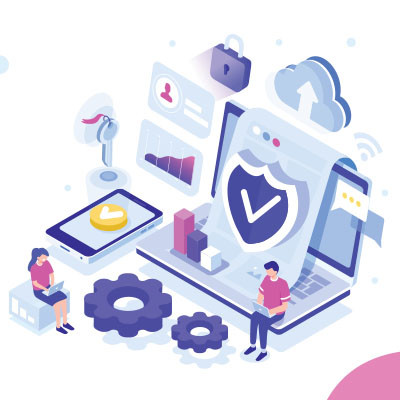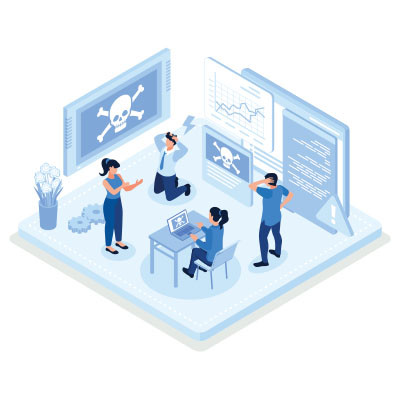Does your organization have the good fortune of having an in-house IT department? More likely than not, even if you do, your department has maybe a couple of technicians at most, and they are all up to their ears in work, whether it’s keeping up with maintenance or struggling to implement new and innovative solutions. If you’re looking for ways to upgrade your organizational IT infrastructure, we recommend you start with a network audit to determine what needs to be done (and how we can help you do it).
Apex Technology Blog
If you’re feeling trapped by your current IT provider, you’re not alone. Many business owners live with a nagging fear: "If my IT guy left tomorrow, my entire business would grind to a halt."
This feeling of being held hostage, where you can't fire an underperforming provider because they hold all the "secret knowledge," is a real and paralyzing problem.
Business leaders and decision makers have plenty to deal with… and that’s before factoring in all the problems and obstacles that pop up over the course of their normal operations, particularly when it comes to the technology their businesses rely on.
Naturally, a smart business owner would want their technology to be as reliable as possible, available without requiring conscious effort. As it happens, one of the modern options for IT support enables circumstances to be as close to this ideal as possible… but the other predominant option ultimately gives you more to worry about.
Are you blindly sprinting forward where your technology is involved, picking things that sound good, hoping you have enough forward momentum to reach the next stop? Unfortunately, this approach is often an option that many businesses take, usually to their detriment.
We want to remind you that you there is a better way: creating an IT roadmap to strategically merge your technology with your more functional business goals, helping you progress with every dollar invested.
In Raleigh and Durham, business is booming, with employment rising all across the region. While this is certainly something to celebrate, it begs the question: is your business equipped with the technology to remain competitive and the support needed to keep this technology in working order? While IT should be a strategic asset pushing operations forward, many business owners settle for subpar technology support and its consequences simply because they are concerned about what it would take to switch.
The thing is, they don’t have to be.
Your business is growing. You're focused on your clients, your services, and your bottom line. The last thing you have time for is a technology headache. Yet, for many small and medium-sized businesses in Greensboro, frustrating IT issues are a daily reality… sluggish systems, cybersecurity worries, and unresponsive tech support can (and frequently do) bring productivity to a grinding halt.
What if we told you it doesn’t have to be this way?
For pediatric practices across North Carolina, technology should be a tool that enhances patient care, not a source of constant worry.
Yet, with the rise of telehealth, complex compliance regulations, and the ever-present threat of cyberattacks, managing IT can feel overwhelming. Many practice owners fear changing providers, opting to stick with the "devil they know."
Apex Technology is here to show you a better way.
For small businesses in Raleigh, tech issues can be a real headache. Honestly, tech is everything these days: it runs your business, keeps customers happy, and fuels growth. But it’s not easy. Think cyberattacks, sudden system crashes, and needing tech that can actually grow with you. Seriously, the dangers are legit, so you need to be smart and plan ahead with your IT setup.
Robust IT tools and services are no longer a luxury, but the very lifeblood for organizations of every size. They provide the essential direction, unwavering stability, and seamless connectivity required not just to survive, but truly thrive in an increasingly digital world.
That said, the questions remain: what exactly constitutes these pivotal "IT tools and services," and more importantly, why should they take a top spot on your business priorities?
If you or your business are worried about cybersecurity, we’d like to say, “Congratulations, you get it!” Too many people fail to take cybersecurity seriously, and with hackers and data breaches making headlines worldwide, you cannot underestimate them. Today, we want to cover how a cybersecurity consultant can save you time, money, and stress over your security systems.
It should come as no surprise that nowadays, a business’ information technology and security precautions are frequently tied closely together—and wisely so. Not only can today’s technology greatly augment the security a business can defend itself with, but advanced security is needed to protect the critical IT that modern businesses rely on to function.
This makes it critical that these two aspects of your business work together, so let’s go over some ways to ensure they can do so optimally.
It’s always an exciting time when you commit to a new IT project that promises to change your organization for the better. Of course, the exciting stuff is what comes after the implementation process—a process that can range from easy-as-pie to incredibly complex and stressful, depending on the expertise your organization employs.
For any business to succeed, it needs to exhibit some degree of empathy toward its audience. Otherwise, the services and products they offer will be less likely to meet the priorities and needs that its targets are experiencing.
As a managed service provider, this is perhaps most true of us, as our services revolve around predicting the needs of our clientele and resolving them… ideally, before the client even realizes they have a need to fulfill.
Technology has ingrained itself into just about every facet of modern life, particularly in the business world where every competitive edge makes a difference. Many small and medium-sized businesses simply don’t have the staff on-hand to manage and maintain their technology solutions, instead opting to outsource this important responsibility to managed service providers (MSPs).
For the IT administrator and the small business owner, it can be a bewildering experience when your company comes under siege from employee-induced cyberthreats; especially if you, like many other companies, have started prioritizing security training. Even if the threat is thwarted early and the effect on the business is negligible, it is important that you trust the people who have access to your organization’s digital resources. Let’s look at some of the reasons some of your staff take cybersecurity initiatives worse than others.
Businesses will often go into the process of self-improvement with unrealistic expectations for how much they can significantly improve their functionality. This simply is not true, and sometimes business owners need to realize that real change—the kind that yields real results—takes time. Thankfully, there are some actionable steps you can take to ensure that your business is moving in the right direction.
We have the pleasure of working with many businesses, some of whom take more advantage of our remote services than others. We wanted to take a few moments to discuss one of our more discreet client organizations and a challenge we helped them resolve. Hopefully, sharing this won’t land us on the naughty list.
The cloud has enabled managed IT service providers, or MSPs, to fill a uniquely shaped void in many companies’ business models. Working with a managed service provider can make up for all of the traditional challenges of technology maintenance and management while also affording you unique opportunities to reduce costs, minimize waste, and maximize productivity.
Compliance is a critical element of many businesses’ requirements, with pretty severe penalties as a consequence if the prescribed standards are not met. Even more importantly, most compliance requirements and regulations are put in place for the welfare of not only the business, but its clientele as well. This makes it critical to know which apply to your business, and how to meet them fully.
How does your business manage its IT? Do you have an in-house team, and how busy are they with all of the hustle and bustle of their everyday duties? Do they have time to address the many challenges and requests made of them? If not, then perhaps you should consider a different model for your IT management. Luckily, we have just the opportunity for you, and you won’t want to miss out on it.





























